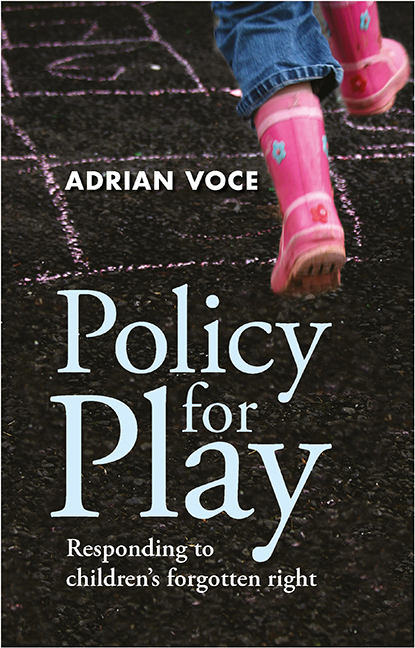Book contents
- Frontmatter
- Dedication
- Contents
- Who’s who
- About the author
- Preface
- Foreword
- Prologue
- Introduction ‘To respect, protect and fulfil’
- one ‘To play and to dream’ • Restoring play to the heart of the campaign for children’s rights
- two ‘For a change’ • Finding the evidence for play policy
- three ‘Advocates for play’ • Playwork’s place at the heart of the play movement
- four ‘New opportunities’ • Lottery funding and the beginnings of public play policy
- five ‘A vital and vibrant city’ • How devolved government in London set a benchmark for play policy
- six ‘Making the case’ • The call for a national play strategy
- seven ‘Things to do, places to go?’ • How play was overlooked by children’s services reform
- eight ‘Getting serious’ • The national play review
- nine ‘Lottery millions’ • The Children’s Play Initiative
- ten ‘Dirt is good’ • The Play England project
- eleven ‘The best place in the world’ • The Play Strategy for England
- twelve ‘Playbuilders’ • Breaking the mould of the public playground
- thirteen ‘Everyday adventures?’ • Austerity brings an end to play policy in England
- fourteen ‘Skylarks and canaries’ • The legacy of the Play Strategy
- fifteen ‘Children now’ • Responding to children’s right to play: conclusions and recommendations
- Epilogue
- References
- Index
two - ‘For a change’ • Finding the evidence for play policy
Published online by Cambridge University Press: 08 March 2022
- Frontmatter
- Dedication
- Contents
- Who’s who
- About the author
- Preface
- Foreword
- Prologue
- Introduction ‘To respect, protect and fulfil’
- one ‘To play and to dream’ • Restoring play to the heart of the campaign for children’s rights
- two ‘For a change’ • Finding the evidence for play policy
- three ‘Advocates for play’ • Playwork’s place at the heart of the play movement
- four ‘New opportunities’ • Lottery funding and the beginnings of public play policy
- five ‘A vital and vibrant city’ • How devolved government in London set a benchmark for play policy
- six ‘Making the case’ • The call for a national play strategy
- seven ‘Things to do, places to go?’ • How play was overlooked by children’s services reform
- eight ‘Getting serious’ • The national play review
- nine ‘Lottery millions’ • The Children’s Play Initiative
- ten ‘Dirt is good’ • The Play England project
- eleven ‘The best place in the world’ • The Play Strategy for England
- twelve ‘Playbuilders’ • Breaking the mould of the public playground
- thirteen ‘Everyday adventures?’ • Austerity brings an end to play policy in England
- fourteen ‘Skylarks and canaries’ • The legacy of the Play Strategy
- fifteen ‘Children now’ • Responding to children’s right to play: conclusions and recommendations
- Epilogue
- References
- Index
Summary
Play practitioners and advocates tend to resist the imposition of extraneous agendas onto the play environment. It is one of the playwork principals (PPSG, 2005). But in the policy world of quantifiable outcomes, measurable impacts, cost–benefit ratios and the like, this can be a problem. Politicians – and perhaps electors too – want policy to be demonstrably effective. If public money or legislative authority is to be invested in something, then it had better produce results. Playing does not produce results; at least, not predictable ones of the kind that can easily be measured, evaluated and reported on.
Playing is an instinctive and universal human behaviour. In its way, it is as simple and as complex as anything else in nature. It is self-evident when children are playing, yet difficult to pin down where it starts and where it finishes (Sutton-Smith, 1997). This paradoxical quality – of something natural and innate on the one hand, yet complex and indefinable on the other – is further complicated for play advocates by the inconvenient truth that the more we learn about it, the clearer it becomes that play’s primary purpose is simply to enjoy and become better at playing. Children play because it is in their nature, but it serves no subjective purpose other than to be enjoyed and to enhance itself.
Of course, we know in general terms that children’s play does enhance their prospects. We can say that children who are allowed a good amount of time to play in the right environments will tend to be healthier, develop faster and do better in school than those who are not (Lester and Russell, 2008); but the specific benefits, and the risks too, are unpredictable.
But even accepting the important role of play in children’s development, any approach that seeks to capture and measure the impact of different variables is going to quickly come up against the dilemma of how to monitor it without manipulating it. Theorists and practitioners alike – and not only those advocating the playwork approach – have argued that even introducing the concept of measurable outcomes to children’s play risks perverting a complex, ancient and delicate dynamic, interfering with the child’s experience and undermining a profound biological process (House, ed, 2011).
- Type
- Chapter
- Information
- Policy for PlayResponding to Children's Forgotten Right, pp. 21 - 32Publisher: Bristol University PressPrint publication year: 2015



